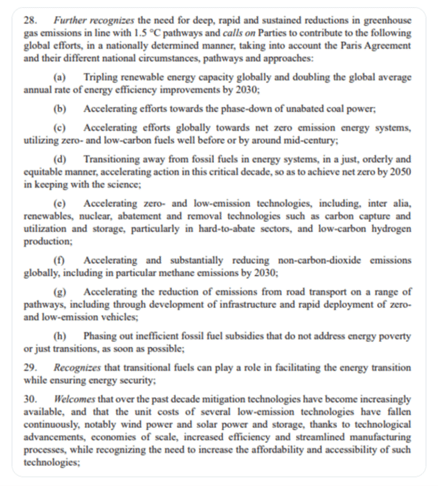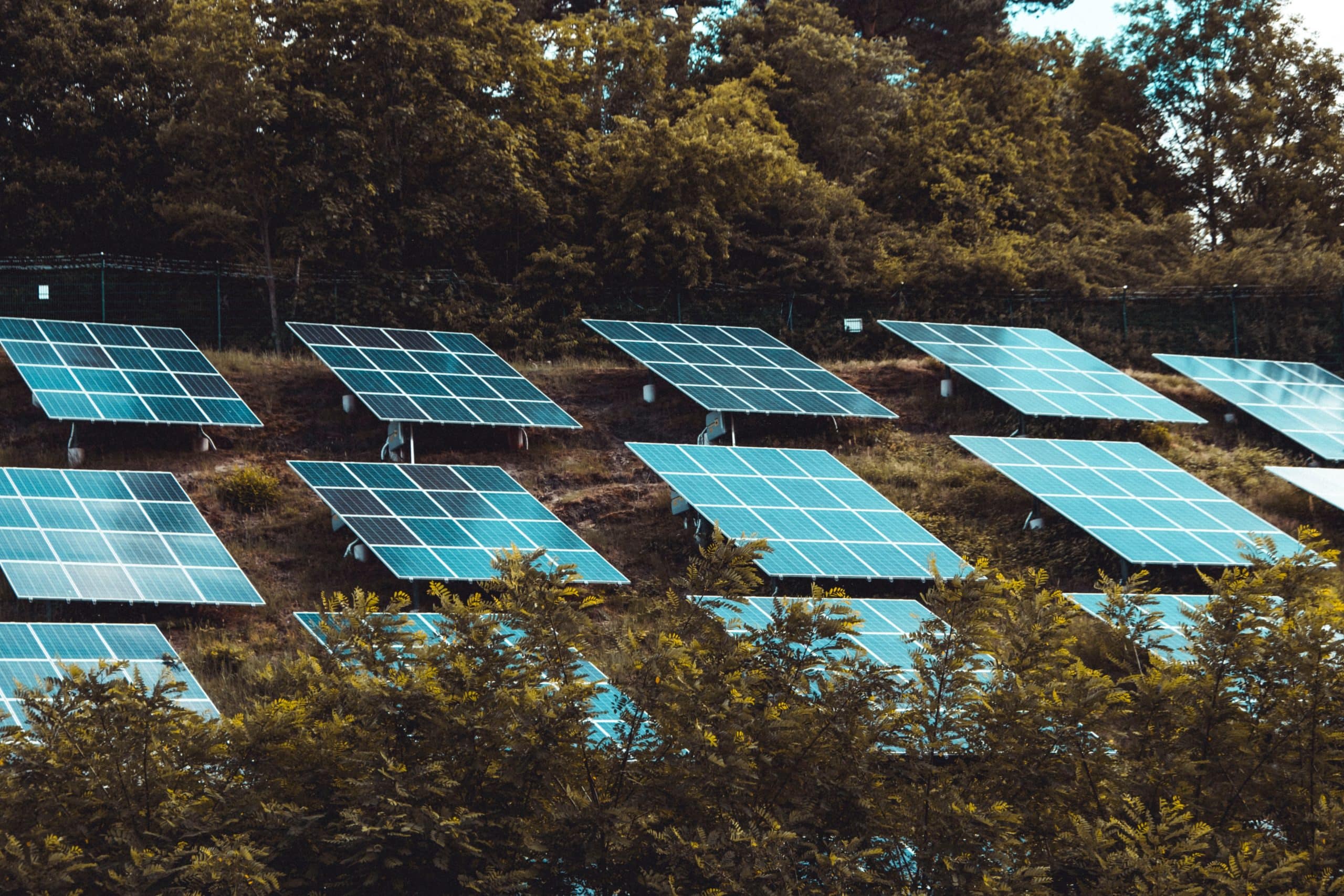
COP28 debrief – is “transition away” enough?
COP28 was a momentous one with numerous steps forward, and new pledges and promises made. We’re excited to see food systems being given a spotlight at this conference in particular. However, as we’ve come to expect, there are still criticisms that these new agreements don’t go far enough and leave too many loopholes. The main talking point? Fossil fuel phase out. There was much dispute over the language of the Global Stocktake text. In this blog post, we’ll be explaining what we liked, what we think is missing, and what this actually means for businesses.
Global Stocktake and fossil fuels – what happened?
The Global Stocktake was the most scrutinised text at COP28. After fierce pushback on the watered-down language on emissions and fossil fuels, the final text saw a few improvements – but we’ll let you read the full text for yourself!

The highlights
- It’s a clear call to action to boost renewable capacity and energy efficiency.
- Whilst it might seem remarkable, this is the first time a decision text has cited fossil fuels in the history of the UN climate talks.
- It’s the “first time in three decades of climate negotiations the words ‘fossil fuels’ have ever made it into a COP outcome … The genie is never going back into the bottle and future Cops will only turn the screws even more on dirty energy” – Mohamed Adow, from Power Shift Africa.
- Espen Barth Eide, Norway’s climate and environment minister, said: “It is the first time that the world unites around such a clear text on the need to transition away from fossil fuels … It has been the elephant in the room – at last, we address it head-on. This is the outcome of extremely many conversations and intense diplomacy.”
- It’s the first time there’s been a direct call for the phasing out of fossil fuel subsidies that don’t address energy poverty or just transitions.

What’s still missing?
- There was no set baseline for renewable energy capacity – some countries will be able to choose baseline years that allow them to set a less ambitious target.
- The text around phasing out unabated coal power isn’t any stronger than COP26 (2021) texts, and the definition of “unabated” isn’t crystal clear, leaving some wiggle room.
- However, the text doesn’t go so far as to demand a “phase-out” of fossil fuels. Instead, it calls for “transitioning away from fossil fuels in energy systems, in a just, orderly and equitable manner, accelerating action in this critical decade”.
- In UN speak, “transitioning away” is weaker than “phasing out”. 100 nations lobbied hard for the stronger language, with vocal vulnerable island nations facing opposition from the OPEC group of oil-producing states.
- Whilst the direction is clear, “transitioning away” is unlikely to be strong enough to stop fossil fuel investments completely.
- Carbon removal technologies are still nascent, and the field remains unclear. Whilst every tonne of carbon we can remove is helpful, it’s unlikely that removal technologies will provide us with the scale of removal we’ll need.
- The definitions around “inefficient fossil fuel subsidies” are open to interpretation.
- The language around transitional fuels points towards increasing reliance on gasses and other fuels. When the cost of renewable generation has been plummeting rapidly, is this an unnecessary interim measure?

What do we think will happen going forward?
As we enter 2024, it is now the responsibility of national governments to translate these global commitments into their national commitments and roadmaps. The text, while in many ways breaks new ground for an agreement at the scale of COP, still leaves a lot of room for interpretation. As such, we’d expect that those governments who were already taking energy transition seriously will keep doing so, and set more ambitious targets, as they are expected to. Those who may have had less ambitious targets will probably make some smaller, incremental progress, but it may not be enough. However, we’re hopeful that this has set the stage for mechanisms at COP29 and COP30 to set us up for more ambitious national commitments that align with Paris Agreement targets.
So what does it mean for businesses?
Energy businesses
Governments will likely begin increasing the ambition of their energy transition agenda. Businesses operating in the energy generation and distribution sectors who have aligned their strategy with a clean energy future will likely continue to benefit from significant opportunities to support the transition. On the other hand, businesses in these industries that are still focused on dirty energy should recognise that there is no going back, and time for fossil fuels is very clearly limited. They will rapidly need to work to align their business strategies and plans with a clean energy transition.
Other businesses
In the finance sector, shifting the investment portfolio towards clean energy options and zero/low-emissions technologies is a smarter decision than ever with these called for at a global scale. For other companies, it means that you are likely to see more opportunities and benefits from increasing self-generated renewable energy. We can be more confident that purchases of green tariffs or Renewable Energy Certificates are doing what they are meant to.
You’re likely to see greater returns on investments in R&D into clean technologies in your sector. Investing to transform your core business model into a more sustainable one will also pay dividends. For more on this, read our blog on sustainable R&D by our innovation partners Apogee.

In summary
Despite the limitations of COP28 and the Global Stocktake leaving many people feeling frustrated, we finish off 2023 with a glimmer of hope. COP28 brought us another step closer to the 1.5-degree target, and upcoming COPs are geared towards being even more impactful. Looking ahead to COP29 and COP30, hosted by Azerbaijan and Brazil, these conferences mark critical moments. In the next two years, COP29 will establish a new climate finance goal, and COP30 requires nations to present comprehensive, economy-wide reduction targets aligned with the 1.5°C limit.
There is always scepticism around global conferences, but tangible change comes from nations, cities, companies, and communities coming together to take concrete and measurable action in the real world. Looking forward, the business case for sustainability strengthens yearly, irrespective of global agreements. As technology advances and funding increases, the rationale for transitioning to low-carbon, sustainable practices becomes more evident. We see many of our clients driven by ethical considerations, regulatory requirements, and increasing consumer demand.
Whatever is or isn’t agreed, we know that to keep to the 1.5-degree target and limit global warming and our impact on this planet, businesses can play a key role. We’re hopeful about the role of businesses as a force for positive change and the anticipation of more impactful commitments at future COPs. For now, we know that it can be information overload, so get ready for a summary of key takeaways in the New Year.

